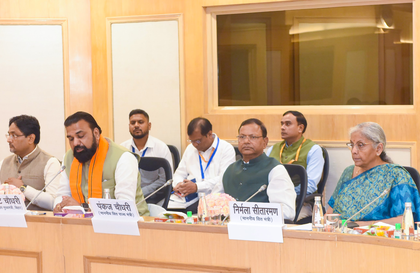States to get Rs 10 lakh crore in SGST, Rs 4.1 lakh crore via devolution despite rate rejig
By IANS | Updated: September 2, 2025 11:20 IST2025-09-02T11:17:07+5:302025-09-02T11:20:16+5:30
New Delhi, Sep 2 States will remain net gainers from GST collections in FY26 even under the proposed ...

States to get Rs 10 lakh crore in SGST, Rs 4.1 lakh crore via devolution despite rate rejig
New Delhi, Sep 2 States will remain net gainers from GST collections in FY26 even under the proposed rate rationalisation — and are expected to receive at least Rs 10 lakh crore in SGST plus Rs 4.1 lakh crore through devolution, an SBI Research report said on Tuesday.
This is because of the unique revenue-sharing architecture of the tax. First, GST is shared equally between the Centre and the States, with each receiving 50 per cent of the collections. Second, under the mechanism of tax devolution, 41 per cent of the Centre’s share flows back to the states.
“Taken together, this means that out of every Rs 100 of GST collected, states ultimately accrue nearly Rs 70.5 — approximately 70 per cent of total GST revenues,” the report noted.
The gains accrues even when we do not take the additional consumption boost due to rate rationalisation (at 9.5 per cent effective GST rate, this translates into a revenue gain of Rs 52,000 crore; Rs 26,000 crore each to Centre and states).
According to the report, evidence from earlier rounds of GST rate changes, such as those in July 2018 and October 2019, suggests that rationalisation does not necessarily weaken revenue collections.
“Instead, the evidence points to a temporary adjustment phase followed by stronger inflows. While an immediate reduction in rates can cause a short-term dip of around 3–4 per cent month-on-month (roughly Rs 5,000 crore, or an annualised Rs 60,000 crore), revenues typically rebound with sustained growth of 5–6 per cent per month,” the report mentioned.
At the time of launch of the GST regime, the states were assured that a 14 per cent increase in their annual revenue for five years of the transition period from July 1, 2017 to June 30, 2022 will be protected and also guaranteed that their revenue shortfall, if any, would be made good through a compensation cess levied on luxury goods and sin products such as liquor, cigarettes, other tobacco products, aerated water, automobiles, and coal.
As decided by the GST Council, states have been provided a total compensation of Rs 9.14 lakh crore as compensation for protecting their tax revenues post implementation of GST for the entire transition period of five years.
This amount was almost Rs 63,265 crores (at an aggregate basis) more than the projected amount that states were expected to get from their assured 14 per cent increase, the report noted.
Disclaimer: This post has been auto-published from an agency feed without any modifications to the text and has not been reviewed by an editor
Open in app